Tuesday, February 26, 2013
Ex-Chicago Bull / NBA Superstar "Dennis Rodman" arrives in DPRK
They were greeted at the airport by Son Kwang Ho, vice-chairman of the DPRK Olympic Committee, and other officials. Dennis Rodman even tweeted out his arrival.
Monday, February 25, 2013
Kim Jong Un Inspects Artillery Firing Drill of KPA
The dear respected Marshal Kim Jong Un, first secretary of the Workers' Party of Korea, first chairman of the National Defence Commission of the DPRK and supreme commander of the Korean People's Army, issued an order to conduct an artillery firing drill in order to examine the capability of artillery units to fight an actual war and guided it on the spot.
He learned about the training program and the deployment of firepower units from the commander of the exercise before ordering its start.
At that moment, an endless barrage of shells were fired by artillery pieces on the "enemy's positions," their roar rocking heaven and earth, and all of them were enveloped in flames.
Feasting his eyes at the "enemy positions" in flames, he was satisfied with the shells accurately hitting the targets.
He noted that if the drill leads to an actual battle, the enemies will be hit so hard by the retaliatory strikes of the infuriated powerful revolutionary army of Mt. Paektu that they would not be able to raise their heads again.
He highly praised the artillerymen for their successful drill.
He said that he was examining the preparedness of units for an actual battle after issuing an order all of a sudden, adding that the drill once again convinced him that all the officers and men of the army are waiting for an order of the supreme commander for a final attack, keeping themselves in maximum alert.
He set forth important tasks to be carried out by the army to make thorough preparations to go into action.
He also clarified in detail issues of further modernizing the artillery force to cope with the escalating reckless maneuvers of the enemies for a war of aggression.
He emphasized that the artillerymen should always be ready to open fire to hit the targets anytime an order is issued and deal merciless blows at the enemies when they preempt firing.
He saw the military hardware newly developed by the army.
He had a photo session with the service personnel of the units.
He was accompanied by Choe Ryong Hae, Hyon Yong Chol, Kim Kyok Sik, Kim Yong Chun, Ri Yong Gil, Son Chol Ju, Ryom Chol Song, Jo Kyong Chol, Yun Tong Hyon, Kim Yong Chol, Pak Jong Chon, Yun Tong Hui, Kim Thaek Gu, Pak Tong Hak, Rim Kwang Il, Choe Pu Il, O Il Jong, Kim Kyong Ok, Ri Jae Il, Ra Chong Il and Hong Yong Chil.
Sunday, February 24, 2013
Guidance to Flight and Skydiving Exercises of Airborne Troops
Marshal Kim Jong Un, First Secretary of the Workers’ Party of Korea, First Chairman of the DPRK National Defence Commission and Supreme Commander of the Korean People’s Army, guided the flight and skydiving exercises of airborne troops of the Air and Anti-Aircraft Force and Large Combined Unit 630 of the KPA.
After being briefed on the plan of the exercises from an officer in charge of the exercises in an observation platform and examining in detail the preparations for the exercises and the climatic condition affecting them, he issued an order to start them.
He expressed great satisfaction, repeatedly praising the heroic flying corps and stalwart combatants whenever they performed their tasks with credit.
Noting that the exercises were quite successful and that the pilots and combatants creditably fulfilled their hard tasks in spite of very unfavouarble climatic conditions, he said that this was the outcome of their effective training at ordinary times.




He stressed that the service personnel should add fresh fuel to perfecting combat preparedness, always maintaining the highest vigilance, and that if the enemies dare make any provocations, they should deal staggering blows at them without giving them a moment’s breathing spell and blow up the strongholds of aggression by giving full play to the inexhaustible combat capabilities they have built up.
That evening he invited to Pyongyang the officers and men of the units who took part in the exercises and had a photograph taken with them.
DPRK People Enjoy Full Moon Day
The Beautiful Sangwon Ravine - DPRK
Up the ravine from its mouth there is the Kumgang Falls. The stream flowing down the ravine falls over a narrow cliff to form the waterfall. It was named so because it is fascinatingly beautiful. On a high rock on the left of the falls stands the Kumgang Pavilion that commands a fine view of the surrounding scenery. Farther up from the Kumgang Falls you come to the Taeha Falls. Its name means that it lies at the base of Inho Rock. Water coming down from the Ryongyon Falls and the Sanju Falls joins to flow down over a precipice looking like steps to form the Taeha Falls.
Farther up, cliffs rise high in front of you, and on the left of the cliffs is the Ryongyon Falls, one of the largest waterfalls of the mountain. It is 84 metres high. On the rock overhanging the waterfall is the mysterious Ryong (dragon) Pool, which gave the waterfall its name. Water flowing down the ravine of Popwang Peak slides over a rock into the pool to fall over a cliff to form the Ryongyon Falls that looks like unrolled white silks hanging from the sky. Its water again falls down a high sloping cliff with a roaring sound. As a typically sloping waterfall, it falls sending silvery sprays up into the air. Up the water course of the waterfall there is a broad bedrock on which are inscribed the words Ryongyon and the letters sinsongulthaek unhadongchon that means “Is this a fairyland? Sprays are sent up into the air,” a line of poem written by Yang Sa On, a 16th century writer.
Fifty metres away from the Ryongyon Falls there is the Sanju Falls. The two waterfalls flank the Sangwon Hermitage, so they are also called twin falls. Unlike the Ryongyon Falls, the Sanju Falls is an upright waterfall. The name of the waterfall means that it seems to throw up tens of thousands of beads into the air.
A little way up the water course from the Ryongyon Falls, towards Popwang Peak, there is the Chonsin Falls. Seen from Ryongju Peak on the east of the Sangwon Ravine, the waterfall looks like an unworldly man descending from the heaven. Hence the name Chonsin Falls. At a close range you can see the stream flowing over tiered cliffs.
By the Ryongyon Falls opposite the Sangwon Hermitage there rises a high and large rock called Inho Rock. The name of the rock derived from the tale about a tiger that showed a traveler the way up to the hermitage from below the Ryongyon Falls. The rock looking like a long ship singularly protrudes from the southwest edge of the precipitous cliff of the Ryongyon Falls. Grand and singular and topping a 200-metre-high cliff, the rock is famous as a splendid look-out platform. On the rock stands a pavilion that commands a fine view of the ravine. From the pavilion one can see three waterfalls of different forms at the same time. It is a sight rarely to be seen elsewhere. From olden times it has been noted as one of the eight fine sceneries of Myohyang Mountain. The surrounding scenery is as beautiful as a landscape picture with the Sangwon Hermitage in thick foliage and large waterfalls cascading down with roaring sounds over steep cliffs before and behind the hermitage.
The view of the moon from the Pulyong Cell is also noted as another of the eight scenic beauties of the mountain. The Pulyong Cell is an old building situated beyond two low ridges east of the hermitage. Beside the Sangwon Hermitage, there is the Nungin Hermitage in the Sangwon Ravine. Of all hermitages on the mountain, it is placed highest, backed by famous Popwang Peak that consists of precipices without a single tree. Flanked by Oson Peak to the east and Kwanum Peak to the west, Popwang Peak is a mass of rocks of myriad shapes.
A little way up to the east of the Sangwon Hermitage there is a long rock called Ryonggak Rock because it looks like a dragon’s horn. Several pine trees growing on the curiously shaped rock add to its attraction. Go round the rock and you will come to the Chuksong Temple on an elevation. The temple has the best mural paintings in the Mt. Myohyang area.
With a crystal-clear stream running down over clean stones between large fantastic rocks in thick forests to form waterfalls and blue pools, soaring peaks with fine views, and old buildings on scenic spots, the Sangwon Ravine is noted for its beautiful scenery in the mountain. So, the ravine with its wonderful scenic beauty is well-known in the world.
Pyongyang Ophthalmic Hospital
Pyongyang Ophthalmic Hospital, donated by the International Association of Lions Clubs, was inaugurated in June Juche 94 (2005). It is in Thongil Street of Pyongyang, with the main building—one storey under and three storeys above the ground—and several auxiliary buildings.
It is fully provided with material and technological foundations for treating and studying eye diseases, and staffed with competent personnel, most of whom completed the postgraduate courses at the then Pyongyang University of Medicine and have now had plenty of ability and experience.
The hospital has recently established a base of producing artificial crystalline lenses.
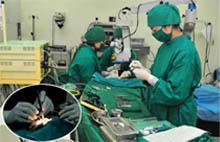
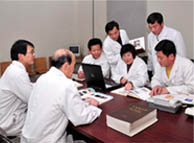
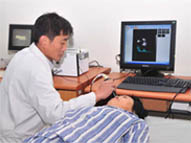
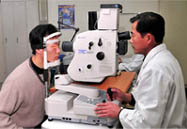
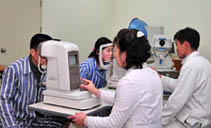
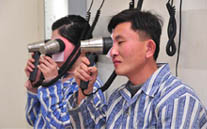
It is making strenuous efforts to keep up with the developing trend of ophthalmology by setting up specialized sections and becoming well versed in advanced technologies and skills.
To this end it frequently holds study sessions for technical knowledge, medical consultations and meetings for sharing experience, so as to solve clinical and technological bottlenecks by the collective efforts.
The ophthalmic research room has developed a new kind of lenses for iris defects, which improved the treatment of myopic patients.
The cataract section cured many patients by treating them with newly-acquired surgical manuals.
Doctors from the vitreous and retinal treatment section, including its chief Kim Man Sok and doctor Kim Kyong Ae, have mastery of microsurgical procedures and can perform operations to correct retinal detachment, the opacity of and hemorrhage in the vitreous body, and other related diseases on a high level.
The laser treatment section is also gaining success in treating eye diseases with argon and YAG laser, while the pediatric section can perform surgery on congenital cataracts and special squint for babies less than one month old.
Its medical workers are also conducting treatment at local hospitals.
The hospital is thus famous among the people for excellent skills of the doctors in medical practice and their deep sincerity devoted to the patients.
Vishwanath Visits Breast Tumour Institute
Wednesday, February 20, 2013
Korea Today Magazine Monthly Journal [English Edition]
Click here to download
March 5 Youth Mine on the Shore of the Amnok River
March 5 Youth Mine located on the shore of the Amnok River in the northern part of Korea makes an active contribution to the country’s economy and the people’s living.
The mine was an uninhabited mountainous remote area until half a century ago.
President Kim Il Sung, who was always on field guidance tour for his country and people, visited the mine in September Juche 53 (1964) and assigned a task of conducting a geological prospecting to officials concerned. When a deposit of a mineral was found out, he unfolded a far-reaching plan for developing the area into a promising mine.
Thanks to his meticulous guidance, the mine was developed into the country’s precious nonferrous mineral producer.
In the 1990s when the country was undergoing difficulties and the mine consequently faced harsh ordeals, General Kim Jong Il indicated the ways to revamp the mine and took measures to this end.
In January 2008 he came to the mine in the bitter cold, traversing high and steep icy roads in the northern region. When he visited it again in September 2010, he spoke highly of the successes the officials and workers there had achieved and advanced new tasks for developing the mine.
Greatly encouraged by his patriotic devotion, the officials and workers finished the project for increasing the capacity of a dressing plant in two years after they had started, the project which would take five or six years to complete, and overfulfilled the concentrated ore production plan every year.
Amidst a brisk innovation drive the mine built and put into operation in October last year another modern nonferrous metal producing base suited to the requirements of the era of knowledge-based economy.
Revitalization of production brought about a marked improvement in the livelihoods of the miners. Modern houses, hall of culture and rest home have been built at the foot of the mountains around the mine.
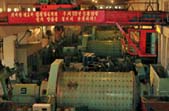

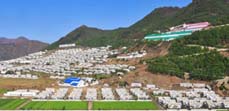
Miners often have swimming contests after a day’s work at the Hoha Health Complex which is fully equipped with cultural and welfare facilities.
At night the miners’ village is as bright as day, showcasing the cultured, rich and happy life of the miners.
The remarkable changes in the mine are the realization of the President’s wish and the General’s ideal and they are the looks of Songun Korea which is hastening the building of a thriving nation.
Sunday, February 17, 2013
New Statues Erected at Mangyongdae Revolutionary School
Also present there were Choe Yong Rim, Choe Ryong Hae, Jang Song Thaek, Hyon Yong Chol, Kim Kyok Sik, Kim Kyong Hui, Kim Ki Nam, Kim Yong Chun, Ri Yong Mu, O Kuk Ryol, Hyon Chol Hae, Kim Jong Gak, and officials of the party and armed forces organs, staff members and students of the school and its graduates, officials of units and military academies at all levels, service personnel of the KPA, military family members and officials and employees of the units who contributed to the erection of the statues and Pyongyangites.
Choe Yong Rim, Choe Ryong Hae, Jang Song Thaek and others unveiled the statues. Laid before them was a floral basket bearing the august name of Marshal Kim Jong Un. Laid there then were a floral basket in the joint name of the Central Committee and the Central Military Commission of the Workers' Party of Korea and the National Defence Commission of the DPRK and a floral basket in the name of the school.
Floral baskets were also placed in the name of the General Political Bureau of the KPA, the General Staff of the KPA, the Ministry of the People's Armed Forces and units and sub-units of the KPA at all levels and military academies.
All the participants paid tribute to the Generalissimos in humblest reverence. KPA Vice Marshal Choe Ryong Hae, member of the Presidium of the Political Bureau of the Central Committee of the WPK and director of the General Political Bureau of the KPA, made a speech there.
He went on:
Kim Jong Il deemed it as an important work for giving steady continuity to the bloodline of revolution to educate the children of revolutionary martyrs from the first day of his revolutionary leadership and paid deep attention to the work of the school in the grim days of leading to victory the confrontation with the U.S. and the struggle for defending socialism under the uplifted banner of Songun.
It was the unanimous desire of all teachers and pupils of the school and service personnel of the KPA to erect the statue of Kim Jong Il at the school where people erected Kim Il Sung's statue for the first time in Korea at the initiative of anti-Japanese war hero Kim Jong Suk who took into consideration the ardent desire of the schoolers to see Kim Il Sung every day.
The ardent desire of the teachers and pupils and all service personnel has become a brilliant reality thanks to the intense loyalty and meticulous guidance of Marshal Kim Jong Un.
Rosy is the future of the children of revolutionary martyrs, the speaker said, calling for waging a dynamic struggle to reunify the country and accomplish the Juche-based revolutionary cause of Songun under the leadership of Kim Jong Un, the banner of eternal victory of the great Paektusan nation, as befitting the descendants of Generalissimo Kim Il Sung and the soldiers and disciples of Generalissimo Kim Jong Il.
Kim Jong Un warmly acknowledged the cheers of all the participants. -0-
Thursday, February 14, 2013
"Poem of Praise of the Shining Star"
Today, too, visitors recite the poem in excitement in front of the monument and warmly remember the story spun around the poem. On the morning of the unforgettable February 16, Juche 81 or 1992, President Kim Il Sung received greetings of the officials and said to them:
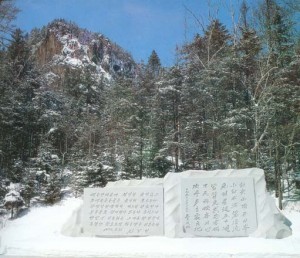 "Today is the 50th birth anniversary of Comrade Kim Jong Il. I have long thought of a gift for him. Today I would like to compose a poem for him."
"Today is the 50th birth anniversary of Comrade Kim Jong Il. I have long thought of a gift for him. Today I would like to compose a poem for him."President Kim Il Sung took up a writing brush and composed the "Poem of Praise of the Shining Star" with selected and brushed words of praise.
Jong Il Peak rises on Mt. Paektu,
The blue waters of the Sobaek meander.
Here, 50 years ago, the Shining Star was born.
A master with pen and sword, loyal and dutiful,
He commands respect and praise from all
And cheers for him rock heaven and earth.
February 16, 1992 Kim Il Sung With the brush still in his hand, the President read the poem again as if to find out any shortcoming. Then he quietly recited it. Wrapped in solemn feelings, officials recited the poem following him. That day, seeing the officials greatly excited, President Kim Il Sung interpreted the meaning of the poem to them.
Ri To Sop, Labor Hero, who is the head of the Stone Sculpture Production Unit of the Mansudae Art Studio, says;
"The moment we received the poem more than 20 years ago, we raised cheers. This is what we want. Each line of the poem represented the greatness of Kim Jong Il. Fascinated by the profound meaning and contents of every word, we designed and engraved letters on the monument representing the mind of the entire servicepersons and people. The emotion of the day is still vivid in my memory."
The "Poem of Praise of the Shining Star" written by President Kim Il Sung in praise of great
Kim Jong Il will be told in history forever.
copyright @ 2012 English Language Service, Voice of Korea www.vok.rep.kp
Wednesday, February 13, 2013
Kumsusan Palace of Sun Draws Endless Stream of Visitors
This proves that Korean people's and the world progressives' reverence for the Generalissimos is growing deeper as the days go by.
At least 12,000 people visited the palace in a recent week.
There is a hall where the statues of the Generalissimos stand in the palace which was perfectly remodeled into a grand monument for immortality of the leaders in terms of contents, style and scope thanks to the intense loyalty and sense of obligation of the dear respected Marshal Kim Jong Un who is ushering in a new chapter for the cause of immortalizing the leaders.
There are the halls of immortality where the Generalissimos lie in state and the halls which house orders they received, cars, electric car, boat and train coaches used by them during their field guidance and foreign tour till the last period of their lives.
Tuesday, February 12, 2013
Ice Sculpture Festival held in DPRK
On display there were thousands of ice sculptures created by inhabitants in Samjiyon County and members of the Ministry of People's Security group under the 618 Construction Shock Brigade. Among them are sculptures depicting Jongil Peak imposingly standing in defense of the birthplace, Kimjongilia, big celebration lantern and vase which reflected deep reverence of the DPRK army and people for Kim Jong Il.
There were also sculptures depicting a green pine on Nam Hill and two pistols, the Marshal's star on the Supreme Commander's flag, satellite Kwangmyongsong 3-2, Changjon Street, Pyongyang Folklore Park and Rungna Dolphinarium. They left deep impressions on the visitors. Some sculptures portrayed people who are full of enthusiasm to boost production in all fields and units of the national economy in hearty response to the New Year Address made by the dear respected Kim Jong Un.
A variety of lighting methods were applied to suit the characteristics of ice sculptures, adding to the aesthetic value of each piece. The ice sculpture festival is visited by many inhabitants in the county and other people every day.
Title of Generalissimoship awarded by the fatherland
Han Kwang Sim, student of Kim Il Sung University, says:
"That day I was out in the street and the moment I heard the news that our General Kim Jong Il was awarded the title of Generalissimo, I could hardly control myself overwhelmed by excitement. I wanted to run to him then and there."
O Han Song, official of the Pyongyang City People´s Committee, says:
"The moment I entered the office room, my colleagues were reading the newspaper. The newspaper was carrying block-letter news that the title of Generalissimo had been awarded to our General
Kim Jong Il. I read the news time and again. With increasing longing, I wanted to see him in the uniform of Generalissimo."
What was seen in the eyes of the people overwhelmed by longing for him?
Pyon Il Chan, a war veteran in Central District, Pyongyang, says:
"I visited the bier of General Kim Jong Il before last farewell with him. Shoulder straps with Marshal´s stars and decorations were laid before his bier from which I could hardly tear my eyes. All of them looked too small and simple. His exploits are known to the world and higher than the sky, but he was awarded the title of Marshal. I felt sorry and felt like crying."
Too small was what the people gave him and too little was what he had received. He had never worn the uniform of Marshal in his life.
In August some years ago, uniform of Marshal had been made for him representing the wish of the people and servicepersons across the country to see him in the uniform. But he declined it with thanks. "I prefer my jumper. To me the medal of hero on the breasts of the soldiers is more valuable than the marshal´s star. The marshal´s star shines because of the hero medals of the soldiers," he said.
Kim Jong Il was such a man. The people were all to him. Only with the people in his mind, he crossed rugged passes of history, built a powerful army and brought the dawn of a prosperous nation.
One year a foreign media carried an article, asking: "What makes leader Kim Jong Il respected by the world?"
"It is because he has made not large Korea a great country, great nation despite the threat and protracted sanctions of the strongest military bloc. Even the enemy cannot but respect so great a leader."
History did not know such a great man. Our General Kim Jong Il was the leader who led the unprecedented defense of socialism to victory after victory at the hardest time, the uncommon patriot who put the DPRK in a position of nuclear state, man-made earth satellite manufacturer and launcher and the unsurpassed statesman who guaranteed the sovereignty and security of the country and nation and happiness of the people.
Kim Jong Il is the Generalissimo and leader remembered in the mind of the people forever. Greeting February 14, the significant day the great Kim Jong Il was awarded the title of generalissimo, the people dedicate a song of praise, bouquet of reverence to Kim Jong Il.
We sing of Songun that built a powerful nation
As the banner of victory
We sing of Songun that glorified Korea
As benevolent sunshine.
O when we sing of Songun of our party
We see the sun In the image of General Kim Jong Il,
We see the sun
In his image, in his image.
Thursday, February 7, 2013
Sincerity devoted to Kimjongilia
Kimjongilia is coming into bloom in the house of Jang Hyon Ju, student of the Pyongyang Agricultural College of Kim Il Sung University, as well.
Her mother Kang Jong Bok has this to say:
"During her primary school days my daughter Hyon Ju visited the venue of the Kimjongilia Festival. At that time she said she wanted to take the flower home and next moment, expressed her will to grow it. So we got a seedling of the flower and began to grow it. But it didn´t grow well. We had difficulty for about one year. But we did our best before the 10th Kimjongilia Festival. After all, the flower we cultivated was selected at the festival. Since then we cultivated the flower with confidence and participated in the festival every year."
Of course, her mother helped her. But cultivation of flower was strange to Jang Hyon Ju and it did not go well with desire alone.
"It did not go as I thought. In summer the flower grew properly, but in winter it was difficult to ensure necessary temperature, light and humidity. What irritated me all the more was that just before the festival some buds did not open and some flowers faded. I nearly burst into tears."
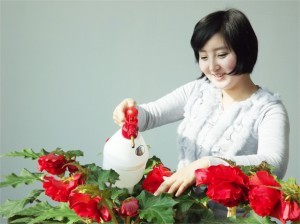 Student Jang asked teachers about the biological characteristics of Kimjongilia, called on horticulturists and heard experiences of those who had cultivated Kimjongilia at home. Perusing various books, she learned the know-how. To cultivate the flower for the festival she built a "greenhouse" in winter and kept vigil several nights, measuring temperature. Such days and months passed and Jang could present more than 50 pots of Kimjongilia to the Kimjongilia Festival seven times until last year from Juche 95 or 2006. In the course she has become a good cultivator of Kimjongilia. Now she has mastered the cultivating technology; she grows the flower bigger and redder and keeps the flower in bloom long. But she did not only cultivate the flower.
Student Jang asked teachers about the biological characteristics of Kimjongilia, called on horticulturists and heard experiences of those who had cultivated Kimjongilia at home. Perusing various books, she learned the know-how. To cultivate the flower for the festival she built a "greenhouse" in winter and kept vigil several nights, measuring temperature. Such days and months passed and Jang could present more than 50 pots of Kimjongilia to the Kimjongilia Festival seven times until last year from Juche 95 or 2006. In the course she has become a good cultivator of Kimjongilia. Now she has mastered the cultivating technology; she grows the flower bigger and redder and keeps the flower in bloom long. But she did not only cultivate the flower."I could see her mentaly maturing, while cultivating the flowers. If the flowers wither even a little, she felt as if there was a flaw in her mind. It was really admirable. Moreover, I found her cry holding Kimjongilia in her arms after hearing the sad news of the demise of Kim Jong Il. That year she had grown the flowers with greater efforts.
Seeing the certificates of participation in the festival increasing every year, I think my daughter is growing so much."
Jang Hyon Ju is showing all her sincerity in cultivating more than 10 pots of Kimjongilia to present to the imminent 17th Kimjongilia Festival.
"I will continue to cultivate the immortal flower Kimjongilia in the future, too."
Undying exploits of Kim Jong Il in party building
Kim Jong Il is the distinguished leader and peerless political veteran who strengthened and developed the WPK into the organizer and guide of all victories of the Korean people and led the Korean revolution to victory.
Since he started to lead the WPK he directed great efforts to strengthening and developing the WPK into the Party of Kim Il Sung guided by his revolutionary idea.
The mid-1960s when he started to work at the Party Central Committee was an important time in the development of the WPK and the revolution. The era and revolution demanded a new qualitative leap and revolutionary change in the building and activities of the WPK, the leading political organization of the society.
It was a great event to our Party and people that Kim Jong Il started to work at the Party Central Committee, the political staff of the Korean revolution, at that time.
The day he started to work at the Party Central Committee in June Juche 53 or 1964, he worked till late at night and greeted new day in his office. Looking at the flying Party flag together with officials, he said it was his lifelong task to strengthen and develop the WPK into the eternal Party of Kim Il Sung. Having declared his will to strengthen and develop the WPK into the Juche-type revolutionary Party shining with the name of Kim Il Sung, he concentrated great efforts on further developing and enriching the guiding idea of the Party, the ideological and theoretical foundation of Party building.
Under his energetic guidance, the WPK solemnly declared at its historic 5th Congress that the WPK is a Juche-type revolutionary Party guided by the Juche idea, the revolutionary idea of Kim Il Sung, and started the grand struggle of modelling the whole Party and the entire society on the Juche idea.
Great Kim Jong Il set it as the fundamental line in Party building to establish a monolithic ideological system in the whole Party and energetically led its implementation. He ensured that it was regarded as the main task of the Party work to firmly establish the monolithic ideological system of Kim Il Sung in the whole party.
Thanks to his wise leadership, today the ideological and purposeful unity of the whole Party around the leader has been further strengthened than ever before and the Party´s organizational and ideological basis and mass foundation have been consolidated as firm as rock.
A historic decision was adopted at the 4th Conference of the WPK to hold the great Kim Jong Il in high esteem as the eternal General Secretary of the WPK, who strengthened and developed the Party into the Party of Kim Il Sung shining with his name and ever-victorious guiding force enjoying absolute support and trust of the popular masses.
It was a declaration of unshakable faith and will of all the Korean army and people to hold Kim Jong Il, who performed immortal exploits in the history of the Juche-based Party building, in high esteem at the head of our Party and to vigorously advance along the long road of Songun revolution under the outstanding and seasoned guidance of respected Kim Jong Un.
The WPK guided by great Kimilsungism-Kimjongilism, the banner of everlasting victory of the Korean revolution, will shine forever as the Party of Kim Il Sung and Kim Jong Il in the future, too, and the Korean army and people will accomplish the revolutionary cause of Juche to the last, flying the Juche Party flag under the leadership of respected Kim Jong Un.
A New Slogan "A-Match-for-a-Hundred" was presented in the DPRK
The great President Kim Il Sung visited the army post on Mt. Taedok on the forefront on February 6th, Juche 52 or 1963. He met the soldiers and officers who were firmly defending the country and looked round different places of the post together with them.
He taught that all soldiers shoud be trained as "a-match-for-a-hundred" warriors so as to strengthen the People´s Army and increase its fighting capacity. He said, from olden times, a general good at battle was called "a-match-for-a-hundred" warrior, which means one man defeats a hundred foes. He stressed the need to firmly arm the entire servicemen with the indomitable revolutionary spirit so that they could defeat a hundred foes each.
This is how the slogan "A-Match-for-a-Hundred" came into being.
The great Kim Jong Il accompanied President Kim Il Sung visiting the post on Mt. Taedok that day and said the slogan "A-Match-for-a-Hundred" represents a high demand for the servicemen to be competent fighters each of whom can defeat one hundred foes in defensive and offensive battles.
He taught in detail that to prepare the soldiers to be a-match-for-a-hundred, they must arm themselves firmly with the revolutionary idea of President Kim Il Sung, master their arms, impregnably consolidate the positions and become familiar with the tactics of smashing the enemy relying on the positions.
During his Songun-based revolutionary leadership, Kim Jong Il visited the post on Mt. Taedok and called on the soldiers to fully demonstrate the invincible spirit of the heroic KPA by further strengthening military and political trainings under the slogan "A-Match-for-a-Hundred".
Today, too, the post on Mt. Taedok is standing firmly as a symbol of "a-match-for-a-hundred", telling forever about the immortal exploits performed under the Songun-based leadership of the great Kim Il Sung and Kim Jong Il in the history of army building.
Monday, February 4, 2013
In DPRK, friendship is won by trust and trust is won by time
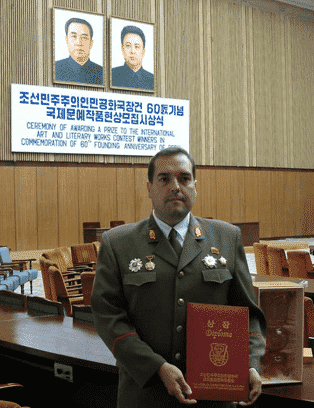 Alejandro Cao de Benós[/caption]
Alejandro Cao de Benós[/caption]Kourosh Ziabari – North Korea, also known as DPRK, is a mostly unknown and mysterious country. There are several preconceptions and myths about it which can be hardly debunked since it is under immense international pressure over its nuclear weapons program and its alleged violation of human rights and most of the people, at least in the Western world, have come to believe that North Korea is not a safe place for living or traveling to. Every year, only a handful of foreign tourists, journalists and media correspondents are allowed to enter the country. Sweden, for some time, was the only Western country in which DPRK maintained a diplomatic presence.
The Western countries regularly lash out at North Korea over what they claim to be its violation of human rights, restrictions on the mass media and political activists and other limitations which it has put on the civil liberties.
However, despite all the allegations which are leveled against North Korea, there’s one other side of the story which is rarely discussed in the mainstream media, and that’s why many people in the world don’t know much about this country. In order to explore that other side, we have done an interview with Alejandro Cao de Benós.
Alejandro Cao de Benós, a Spanish diplomat who is one of the few foreign nationals working with the North Korean government is the Special Delegate of the DPRK’s Committee for Cultural Relations with Foreign Countries and president of the Korean Friendship Association (KFA). Since 1990, he has been advocating for North Korea and his Korean name, Cho Son-il, has been recognized by the Pyongyang government.
Alejandro says that since he was a teenager, his dream was to cooperate with the North Korean government which at the outset seemed unusual and unimaginable for a Western citizen. He received a North Korean passport after establishing the Korean Friendship Association in the year 2000 and since then has been designated a legal representative of the North Korea Foreign Ministry.
Alejandro Cao de Benós took part in an exclusive interview with me and responded to different questions about the North Korean culture, common misconceptions about the country, the portrayal of North Korea in the Western media, human rights and press freedom in the country and its relations with the foreign countries. My Spanish friend Moises Herrezuelo helped me with doing this interview.
Q: It’s reported that North Korea possesses six nuclear weapons, and is technologically capable of boosting the stockpile to 48 weapons by 2015. In 2003, it withdrew from the Nuclear Non-Proliferation Treaty and conducted two nuclear tests in 2006 and 2009. Why is the country pursuing the nuclear weapons program so persistently while it has been under harsh international sanctions and political pressures?
A: North Korea has more than 6 nuclear weapons and is capable of enriching both uranium and plutonium that can be found in national deposits. So the full process is self-reliant. The development of the defense industry and nuclear power for military use is essential as deterrence against a U.S. invasion. We call this “Songun” or Army-first policy.
As we can witness, the empire organized by the White House feels free to invade, exploit resources and destroy the culture and history of any nations in its path: Iraq, Afghanistan, Libya and now Syria.
Only a powerful army with weapons capable of striking the American soil can act as a deterrence to preserve the peace, future and sovereignty for Korea.
We have been under sanctions and pressure for more than 60 years, so the country already learnt how to live by itself diverting the blockades.
In 1994, when President Jimmy Carter visited Pyongyang by appointment of the then President William Clinton, he met our Great Leader Kim Il Sung. Mr. Carter, expecting some begging words asked, “Don’t you want that we remove our blockade and sanctions against you?” and President Kim Il Sung replied, “Do as you wish, we do not care. We have lived always under sanctions and know how to continue with or without them.”
This comes to our mystical phrase when dealing with the USA, “We want the peace but will never beg for it.” And they know well that any negotiation should be made at the same level of respect, not from an arrogant standpoint. Basically, nobody will bring the DPRK to its knees. Sanctions and pressure will only face more rejection from our side.
Q: Some political commentators claim that DPRK has isolated itself in the international community by insisting on continuing its nuclear weapons program and does not have many allies in the world. You are the Special Delegate of the DPRK’s Committee for Cultural Relations with Foreign Countries and are closely aware of the country’s foreign relations. Is this claim true? Is North Korea as isolated and friendless as the Western media say?
A: DPRK is isolated because USA has forced all its servant countries to pressure it by all means: politically, commercially, by propaganda. The Korean people want friendship and peace with all countries but never as slaves.
It seems basic, but is something that arrogant people do not understand: respect. Respect to our country, system and government, elected and supported by the people.
DPRK does not depend on other nations. China itself signed a technological blockade and denounced the launching of our satellite Kwangmyongsong 3-1, acceding to further sanctions by the UN Security Council. But in other aspects like trading, there is much development and interest on behalf of China and other countries. So we could say that although DPRK has only one clear position, there are other countries that have many faces; one for each occasion, depending on their interest.
So, in trade or friends around the world we can say that DPRK is not isolated at all. The Korean Friendship Association (KFA) is slowly breaking the U.S. information monopoly and members around the world amount to more than 12,000. But in terms of defense, we know we should depend only on ourselves.
Q: What do you think are the main reasons behind the negative portrayal of North Korea in the Western media? We constantly hear or read that North Korea is an autocratic regime, suppresses individual freedoms, imprisons political dissidents, etc. What’s your viewpoint in this regard?
A: 98% of the information about DPRK is completely false or just plainly invented. The main reasons are:
1) Propaganda sponsored by the U.S. trough its own media and fake NGOs operated by CIA and its allies.
2) Sensationalism, that brings subscribers and money to the tabloids.
The black hole of information about North Korea is such that is continuously abused by many journalists to fabricate all kind of stories. A military post seen by satellite becomes a concentration camp. A self-defense shelling becomes an invasion. A rocket becomes a threat to the international community. Interestingly the country which makes that claim possesses more than 6000 nuclear missiles and is the only country that has ever used nuclear weapons against civilians.
In the DPRK the people is firmly united under the Juche Idea (Socialism in Korean style) and the leadership of Marshal Kim Jong Un. Because decadent western societies are so individualistic and selfish, they cannot imagine or allow a socialist system that believes in creating a human harmonious society where everything is provided to the people based on equality and where the leaders of the country are not the rich shareholders, but the nation’s masses.
Housing, healthcare, education, foods, clothing are provided by free to each citizen, and if such small country like Korea can be free of drugs and prostitution, how the poor, homeless, jobless people living the ‘American dream’ should feel if they know the real truth?.
Q: The United Nations has so far adopted several resolutions condemning the state of human rights in North Korea. On December 19, 2011, 123 countries voted in favor of the resolution calling on the government to end what they considered its “systematic, widespread and grave violations of human rights,” and a few weeks ago, another resolution was adopted with consensus against the North Korea. Why is it so? How do you see the situation of civil liberties, press freedom and human rights in North Korea?
A: The DPRK rejects any UN resolution that is politically motivated and sponsored by the U.S. We should remember that it was the UN itself, under U.S. control and thanks to the absence of USSR that started the Korean War. More recently it was again the UN that justified the invasion of Iraq, with the pretext of WMDs that never existed.
Our human rights are the real ones: House, education, food, job and happiness for everyone, not just for the rich.
The concept of human rights in the capitalist societies is that you have more rights depending on the size of your pocket. So if you are unfortunate enough to be among 80% of the world population that lives under severe poverty, your only human right in capitalism is: to die.
As for press freedom, believing that it does not exist is really naïve. The difference is that while we recognize that our Korean media is directed to educate the people and educate them in socialist values, Western media are plainly hypocritical.
Each media outlet will broadcast information according to the political alignment of its owners and will never allow other voices to be heard. As an example are my very own interviews with journalists as Christianne Amanpour (CNN), Jennifer Gearey (Time) and Issac Stone Fish (Newsweek). They should fear to hear a voice from ‘the other side’.
Q: Is it true that the North Korea’s mass media have created a personality cult of Kim Jong-il through propagating this belief that he is a divine personality, capable of controlling the weather conditions or other extraordinary actions? Western journalists say that those in North Korea who criticize the leader or fail to pay homage to him will be subject to punishment. What’s your take on that?
A: To understand Korea, one should not simply study Juche Idea, but also Asian behavior and customs, including principles from Buddhism and Confucianism that are deeply rooted in the nation.
The fact that North Korea is strongly united like a big family around a Leader that represents the head of such union, creates a kind of jealousy that from a Western view is ignorantly described as ‘personality cult’.
The love to the Great Leader Kim Il Sung is exactly the same like the love from a son to his father that takes care of him. This is how the Korean people feel, this is why among our close comrades we call ourselves ‘brothers.’
We are not guilty if the individualistic, materialistic people that live in the capitalist jungle cannot feel this kind of love and unity. But their ignorance about our country should not become jealousy.
As for extraordinary things, they are terribly exaggerated by the Western press and put out of context. But it is true that sometimes when a great soul is born or departs this world, some natural phenomenon like double rainbow may happen. Korean people believe in that and Buddhist teachings also explain that, and maybe you can find some similar accounts in the Islam, like the word Allah appearing in natural places.
The Leader is the center, and attacking our leadership means trying to destroy our union. Everybody in DPRK can express his own ideas and opinions freely but it is always done in respect and always reaching a common ground, not trying to impose a private opinion on others. That should be the reason why, being born and raised in a Western capitalist country and working for 22 years for North Korea, I never found a single person in the country against our Great Leaders.
A country like DPRK under such foreign pressure and threats could never survive and continue loyal to its people’s government unless there was a real ideological fortress with a socialist educational system, to pass the knowledge from one generation to another.
Q: I read that each year, only around 1,500 Western tourists come to North Korea, and those who travel to the country must follow strict rules and be always accompanied by official tour guides. Can’t such restrictions on tourism contribute to the distortion of the public image of the DPRK? Overall, what’s your viewpoint toward tourism in North Korea and the face-to-face interaction of the tourists with the people?
A: The limitations in tourism are essential to control the impact of foreign culture and illegal activities. In the past we have hundreds of incidents from people that came as a tourist while their purpose was to spy or sabotage our society.
This is one of the ways used by the U.S. to infiltrate our country through sending ordinary people, sponsor a ‘rebel group’ and let them work to overthrow the government; see Libya and now Syria.
Do not forget that USA is expert in marketing and they know well how to cheat, especially young people that are fed continuous stupidity from satellite channels.
I hope that Iranian people will remain united and fight to preserve their culture, identity and heritage. If you continue listening sweet words from your main enemy you will be invaded culturally, and to be invaded by ground troops is just the next step.
In DPRK, friendship is won by trust, trust is won by time. If you show a good intention, there is no problem for a foreigner to interact, walk around at 02:00 AM or even live in the country.
Q: How is the state of DPRK’s interaction with the foreign journalists? Are the foreign journalists and media correspondents allowed to travel to North Korea? Has any foreign journalist ever interviewed the North Korean leaders or high-ranking politicians?
A: The Korean Central News Agency has agreements with ITAR-TASS, Xinhua, Associated Press, APTN, etc. Each journalist is treated personally, depending on his behavior and intention. If they try to harm, they are expelled from the country, if they have respect, they come regularly to cover different kind of news.
The procedure for journalists is quite strict, but some of them are allowed every year.
As for interviews, I only recall that Washington Post made one to President Kim Il Sung.
Q: Please tell us more about the people of North Korea, their culture, lifestyle, their customs and rituals and the way they see the world. Is it true that the government forces all the people to dress and behave in a single, unchanging way?
A: There are no unemployed or beggars. People are studying, working or serving in the army. Everybody should contribute to the building of a prosperous nation.
Normal work is 8 hours a day. Friday is volunteer work, where everybody, including high-ranking officials like Ministers are mobilized to tasks in construction, cleaning, harvesting, etc.
Saturday in the morning is study time. All people go to the universities, libraries, etc. to improve their political and technical knowledge.
Sunday is free, Korean people like to go the park and BBQ, fish in the rivers, and talk with friends in the many bars available. Beer is a favorite drink, together with Soju (Korean liquor distilled from rice).
To learn instruments, a foreign language, to have driving lessons, to go to the sauna, gym or swimming pool, cinema, theatre is all free. So there is plenty of entertainment but always based into culture, physical sports and moral principles.
People dress as their wish, but always keeping a formality and harmony that will not create conflicts or encourage the appearance of social groups or gangs.
Q: How is it possible to acquaint the global public with the realities of North Korea? What are the most common misconceptions about North Korea which you believe are baseless and false? Are the DPRK’s leaders willing to open the country’s doors to the people of the world and allow them to come and see the realities of the country?
A: By activities, like the ones KFA organizes. But obviously you cannot expect a PR Marketing like ‘Invest in UAE’ because we lack foreign currency, our resources are limited to our hands, and all the responsibilities in KFA are honorary.
In any case, I always recommend that people should see with their own eyes. This is the best way, and in one week you can learn more than any famous journalist or think-tank-pretender that have no idea of what is really going on inside our borders.
Our DPRK Leaders always have kept the country’s doors open for anyone with a good heart. It’s the case that many people did not know that such door even existed. Any person from Iran or other country willing to come to DPRK for tourism, culture or business can contact me. I will be glad to assist them.
Original Article Link
Paektusan Prize Sports Contest under Way in DPRK
Kim Ki Jong, vice-director of the Central Committee of the General Federation of Trade Unions of Korea, told KCNA:
"Through the contest, its participants have fully displayed their skills and techniques trained in ordinary days. Divided into four groups, they have competed in basketball and volleyball events on a knock-out basis. The Ministry of Railways, the Minju Joson and the Foreign Trade Bank top the standings in basketball event. Competitions in volleyball and Taekwon-Do events are under way at gymnasiums in Chongchun Street. The Ministry of Mining Industry and the Education Commission are expected to compete in the finals in the volleyball event. The current sports contest drew more teams from ministries and national institutions than last year, with active participation of their leading officials."
Rim Chun Hak, an official of the Foreign Languages Publishing House, said:
"I took the individual pattern title in the Taekwon-Do event. I began to learn Taekwon-Do at the age of 15. The contest made me feel again the advantage of the Korean traditional martial arts. Taekwon-Do is not simply a sports event. It is a pride of the Korean nation as it displays its wisdom. I have taken part in the contest for consecutive years, and the Foreign Languages Publishing House took the titles in Taekwon-Do event several times. I will make a contribution to honoring the fame of my institution through the contest."
Friday, February 1, 2013
Vol. 3 of "Complete Collection of Kim Jong Il's Works" Off Press
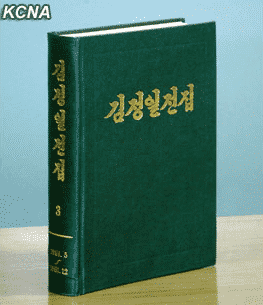 Vol. 3 of "Complete Collection of Kim Jong Il's Works" was published in the DPRK. It deals with his works in chronological order. It contains 108 works such as speeches and talks between May and December Juche 50 (1961). Among the works are "Let Us Glorify the Cause of Our Party Forever" and "On Effectively Guiding Party Life of Party Members in Conformity with Duty of Party Cell".
Vol. 3 of "Complete Collection of Kim Jong Il's Works" was published in the DPRK. It deals with his works in chronological order. It contains 108 works such as speeches and talks between May and December Juche 50 (1961). Among the works are "Let Us Glorify the Cause of Our Party Forever" and "On Effectively Guiding Party Life of Party Members in Conformity with Duty of Party Cell".These works clarify the principled issues to be held fast to in glorifying the cause of the party and developing it into a revolutionary and militant party. The book includes "Youth and Students Are Masters Responsible for Future of Science and Technology in Our Country" and "Let Us Learn from Revolutionary Habit of Study of Anti-Japanese Revolutionary Fighters".
Those works clarify tasks and ways to bring about a radical change in the study of the students. There are also in the book "On Solving the Theoretical Issue of Political Economy on the Basis of Our Party's Policy" and "On Some Experiences in Socialist Economic Construction in Our Country".
These works deal with the issue of thoroughly establishing Juche in scientific researches and successes and experiences gained in socialist construction under the leadership of the Party. There are such works as those clarifying ways to implement the economic policy of the Party. Among them are "On Giving Full Play to Advantages of Socialist Planned Economy" and "7-year Plan Is Economic Construction Programme for Stepping Up Socialist Construction".
The book contains such works as those dealing with tasks facing the youth and students and service members to play the role of a shock brigade in the efforts to realize the far-reaching plan of President Kim Il Sung to build Pyongyang into a more magnificent and beautiful city and with the issues of popularizing sports and making it part of one's life to practice sports. It also contains works which give answers to theoretical and practical issues arising in various fields.
